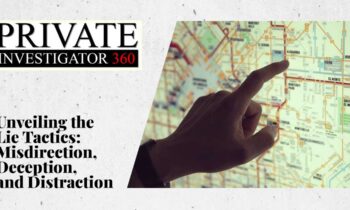Introduction: Permissible Purpose in Private Investigation
In the realm of private investigation, the line between stalking and investigating is defined by one critical factor: Permissible Purpose. With a P.I. license in hand, a private investigator gains the legal authority to discreetly record subjects from the confines of their vehicle or shadow their every move throughout daily routines. These actions, which could easily be misconstrued as stalking, are instead recognized as legitimate investigative work when carried out with a permissible purpose. But what exactly does this term entail? Why is it crucial in the world of private investigation? Join us on a journey as we delve into the depths of permissible purpose, its significance, and the evolving landscape of stalking laws in relation to GPS tracking. By the end, you’ll gain a comprehensive understanding of the pivotal role played by licensed investigators and the ethical responsibilities they bear.

Stalking or Investigating
The Role of a P.I. License: Legal Authority and Responsibilities
A P.I. license is what makes it okay for a private investigator to sit in his car and video record a person he’s investigating. It also makes it okay for him to surreptitiously follow someone (shadow) around as they go about their daily activities. These activities would be considered stalking were the private investigator not licensed and carrying out his work with a permissible purpose.
Defining Permissible Purpose: Key to Legitimate Investigations
Once an investigator is clear that a permissible purpose exists to investigate a person (or put a GPS tracker on a vehicle), most responsible private investigators will take the step of ensuring that there aren’t any court-imposed restraining or protection orders in place.
The Evolution of Stalking Laws: Incorporating GPS Tracking
In recent years, most states have applied and extended their current stalking laws to the use of GPS tracking and this approach actually makes sense.
Don’t forget the check: Private: GPS Tracking Laws (All 50 States)
Expanding on the topic, it is crucial to recognize the importance of permissible purpose in the field of private investigation. Permissible purpose refers to a lawful reason or justification for conducting investigations on individuals. It serves as a safeguard to prevent the misuse of surveillance and tracking methods.
What is an investigation: https://en.wikipedia.org/wiki/Investigation
Having a valid P.I. license provides investigators with the legal authority to carry out their duties effectively. It grants them the right to observe and record individuals while respecting their privacy within the boundaries of the law. This licensing requirement ensures that only qualified professionals with a deep understanding of ethical and legal standards are entrusted with investigative tasks.
Furthermore, responsible private investigators prioritize compliance with court orders and restraining or protection orders. By conducting thorough background checks and verifying the absence of any legal restrictions, investigators demonstrate their commitment to upholding the law and respecting individuals’ rights.
The evolution of stalking laws to encompass GPS tracking reflects the need to adapt regulations to advancements in technology. GPS tracking can be a powerful tool in investigations, but its misuse for intrusive or malicious purposes can pose significant risks to privacy. By including GPS tracking within stalking laws, states aim to establish clear boundaries and deter unlawful activities while allowing legitimate investigations to proceed.
In conclusion, understanding the distinction between stalking and investigating requires a comprehensive understanding of permissible purpose and adherence to legal and ethical standards. Licensed private investigators play a vital role in ensuring that investigations are conducted responsibly and within the confines of the law. By upholding the principles of permissible purpose, investigators safeguard individual rights while pursuing truth and justice.
Conclusion: The Significance of Permissible Purpose in Private Investigation
In conclusion, understanding the intricacies of permissible purpose is crucial for anyone involved in the world of private investigation. It serves as the foundation for conducting lawful and ethical investigations, while safeguarding the rights and privacy of individuals. As technology continues to advance and new challenges arise, staying informed about the evolving landscape of stalking laws and the responsible use of GPS tracking is essential. If you’re interested in delving deeper into the topic or seeking professional guidance, we encourage you to reach out to our team of experienced private investigators. Contact us today for more information and let us assist you in navigating the complexities of permissible purpose in the realm of private investigation.

The goal of this site is simple; to be the most-trusted and best source of information about every aspect of private investigators and private investigations, whether you are looking to do your own private investigation or considering hiring a private investigator.
Paul Baeppler retired as captain from the Cleveland Police Department after over 30 years of service. At the same time, he has also owned and run several private investigation and security businesses licensed in Ohio, California and New York for the past 20 years.
www.clevelandprivateinvestigator.com
www.manhattaninvestigations.com

 Is Video Evidence of Infidelity Admissible in Court?
Is Video Evidence of Infidelity Admissible in Court? The Phone Call
The Phone Call Unveiling the Lie Tactics: Misdirection, Deception, and Distraction
Unveiling the Lie Tactics: Misdirection, Deception, and Distraction Private Investigator vs. Private Detective: Understanding the Difference
Private Investigator vs. Private Detective: Understanding the Difference How to Use a GPS Tracker on a Stalker
How to Use a GPS Tracker on a Stalker The Process of Hiring a P.I. for a Personal Investigation
The Process of Hiring a P.I. for a Personal Investigation